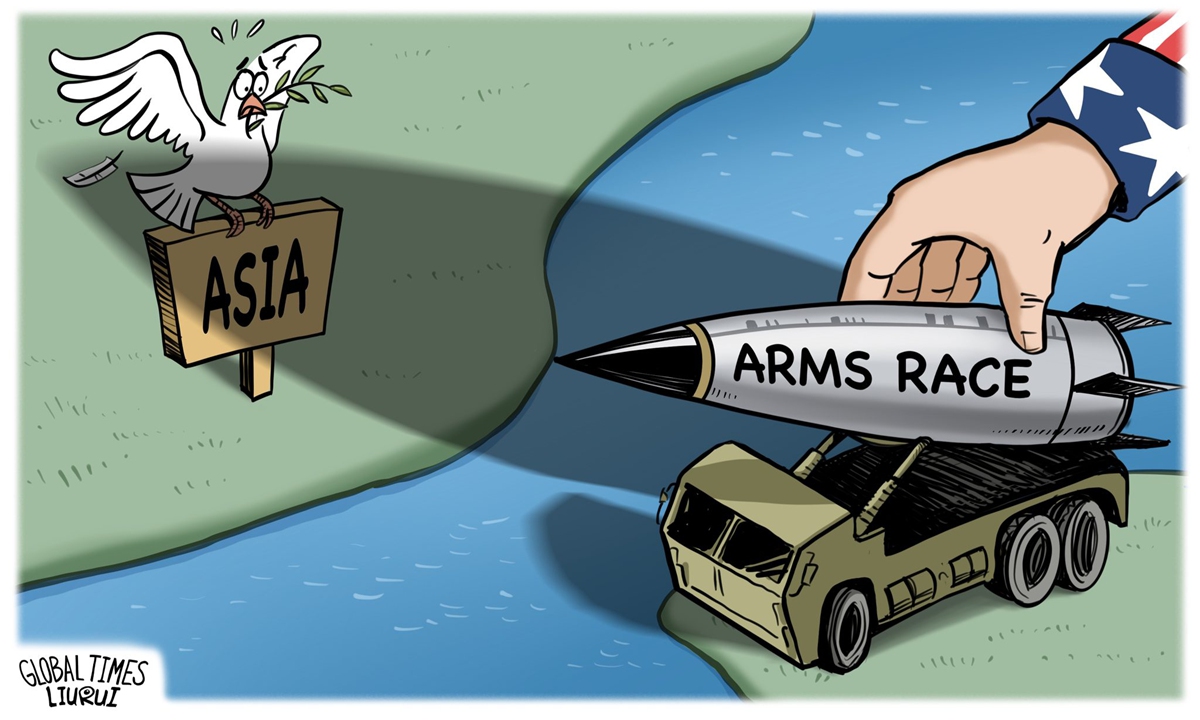Recently, the US deployed the Typhon Mid-range Capability (MRC) missile system in the Philippines, and announced its decision to deploy land-based intermediate-range missile in Europe. This marks a substantial step forward taken by the US on deployment of land-based intermediate-range missiles since its withdrawal from the Intermediate-Range Nuclear Forces (INF) Treaty in 2019. This move shows that the US takes its own interests as the only consideration, reneges on its security commitments to allies and incites them to stand on the front line of containing China, which further undermines global and regional stability.
The INF Treaty was signed by the US and the Soviet Union at the end of the Cold War, aiming to eliminate and destroy their nuclear and conventional land-based intermediate-range ballistic missiles, cruise missiles and missile launchers with a range of 500 to 5,500 kilometers. Although it’s a bilateral treaty between the US and Russia (the Soviet Union), the INF Treaty has played an important role in upholding nuclear strategic stability worldwide, especially in Europe. For the first time in the history of international arms control, the Treaty banned an entire category of weapons capable of carrying nuclear warheads and significantly raised the threshold for nuclear war, thereby playing a crucial role in preventing the outbreak of nuclear war and maintaining strategic stability and security in Europe. The Treaty underscores the special and important responsibility of the US and Russia, as nuclear superpowers, in maintaining nuclear strategic stability. Furthermore, it reflects the US’ important security commitment to its European allies, namely to reduce nuclear strategic risks and safeguard European stability.
As early as in 2014, a number of American think tanks, including RAND Corporation, advocated the deployment of US’ land-based intermediate-range missiles in the Asia-Pacific for the purpose of military containment of China, and called on the US authorities to weigh the security costs of compliance with the INF Treaty, as well as the military benefits and diplomatic costs of withdrawing from the treaty, and to make a “prudent decision.” Subsequently, the US media began to hype up the alleged Russian INF violation until the Trump administration formally decided to withdraw from the Treaty.
From a military perspective, the current land-based intermediate-range missile capabilities of the US are primarily Tomahawk subsonic cruise missiles and similar models, which have long been deployed in large numbers on sea-based and air-based launch platforms. Therefore, the additional military gains of the land-based versions are relatively limited. The US’ decision to deploy land-based intermediate-range missiles in the Asia-Pacific and Europe is mainly driven by the interests of the US Army. In the first decade of the 21st century, the US shifted its military strategic focus to inland counter-terrorism, and the Army gained huge benefits. Over time, as the US put forward strategies and operational concepts such as “return to the Asia-Pacific” and “air-sea integrated warfare,” the Army found itself facing the risk of being marginalized in the so-called great-power competition. The US Army, reluctant to assume a diminished role in the military layout of deterring China, then vigorously advocates the “China threat” theory and calls for the deployment of land-based intermediate-range missiles in the Asia-Pacific.
Despite the limited military benefits, the US is still stepping up the modification of its launch systems and promoting the deployment of land-based intermediate-range missiles in the Asia-Pacific, which further reflects US’ sinister intention to pull its allies to the front line of containing China. Since the US advocated a return to great-power competition and identified China as its primary strategic adversary, it has viewed the alliance system as a crucial asset to win the competition against China. But its allies in the Asia-Pacific generally maintain close economic ties with China and are wary of fully alliance with the US in its efforts to contain China. For the US, the deployment of land-based intermediate-range missiles is a “key point on the chessboard” that could undermine mutual political trust and diplomatic relations between its Asian allies and China. The places where the US intends to deploy its land-based intermediate-range missiles are several fulcrum points geographically adjacent to China. The relevant countries are justified in strengthening their own defense forces, but the deployment of strategic offensive medium- and long-range missiles, which goes beyond their own military necessity, would be a different story. The only value of weapons of this kind is to serve the US military containment of China and even military strikes against China. China will not sit idly by and ignore such behavior. Therefore, with the US making a big fuss about the deployment of these missiles, and violating the basic principles of the international nuclear non-proliferation regime by engaging in “AUKUS” nuclear submarine cooperation, its strategic purpose is to encourage these allies to stand onto the stage and to turn against China, contributing to US’ containment of China.
From the perspective of crisis management, the deployment of land-based intermediate-range missiles by the US would also be an important factor in the escalation of conflicts. On one hand, if these missiles are deployed within its fixed Asia-Pacific military bases, their wartime viability is very fragile. In the early stages of a conflict, US commanders would face the “use it or lose it” dilemma. This kind of decision-making dilemma must be avoided. On the other hand, if the US adopts a mobile launching mode, the launchers are bound to drive out of the base and made a large range of maneuvers in the host country, thus greatly increasing the scope of a potential crisis or conflict. In addition, the forward deployment of strategically offensive weapons by a nuclear state on the “doorstep” of another nuclear state will seriously undermine basic mutual security confidence, exacerbate strategic mistrust between the two sides, and is not conducive to crisis management. The Biden administration stated in the 2022 Nuclear Posture Review that the US is willing to strengthen dialogue with China on strategic risk reduction and crisis management. If the US is truly interested in reducing strategic risks, a good place to start is abandoning the deployment of land-based intermediate-range missiles in other countries.
In short, as the most powerful nuclear and military power, the US bears a special responsibility for international security. In recent years, the US pursued supremacy and acted selfishly based on its likes and dislikes, and challenged the authority of the international security mechanism arbitrarily. It has withdrawn from the INF Treaty and the Open Skies Treaty successively, blocked the negotiation of a verification protocol to the Biological Weapons Convention, and opposed the draft Treaty on the Prevention of the Placement of Weapons in Outer Space and of the Threat or Use of Force against Outer Space Objects proposed by China and Russia. The US has also undermined the basic spirit of international nuclear non-proliferation by carrying out AUKUS submarine cooperation. And there are many other bad records. At the same time, the US coerces a few of its allies to build a so-called “rules-based” new security order, in defiance of UN treaties and mechanisms.
As Ambassador Fu Cong, Permanent Representative of China to the UN, recently pointed out: “the so-called ‘rules-based international order’ advocated by some countries is really intended to create another system outside the existing system of international law and to seek legitimacy for double standards and exceptionalism. There is only one order in the world, that is the international order based on international law. There is only one set of rules, and they are the basic norms governing international relations based on the purposes and principles of the UN Charter.” Amid the profound changes unseen in the world in a century, all countries, major powers in particular, must abandon double standards and the Cold War mentality, uphold the vision of common, comprehensive, cooperative and sustainable security, and work together in good faith under the international order with the UN at its center, so as to join hands to open up a peaceful and stable future for humanity.
The author is director of the Institute of International Security, China Institute of Contemporary International Relations. opinion@globaltimes.com.cn













